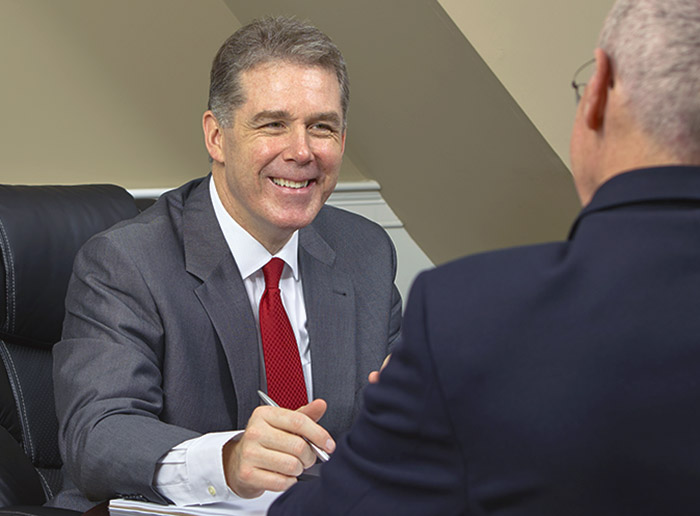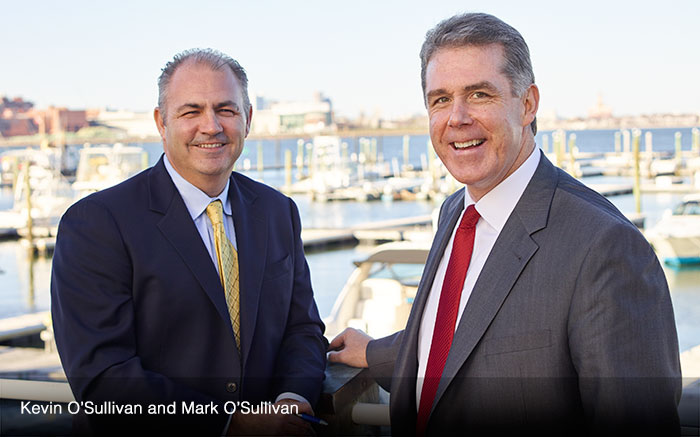No stone unturned

Integrated Financial Partners • Lincoln Financial Advisors Corp.
Read full biography below
Proactive Advisor Magazine: Mark, how has your personal background influenced your professional philosophy?
I grew up the third oldest of 11 kids in the Dorchester neighborhood of Boston. I had great parents, both incredibly hard workers, who did everything they could to see that we earned good educations via a strong work ethic and being guided by the Golden Rule.
They also encouraged us in athletics and many of us played Division I and professional sports. When they both passed away from cancer in their early 50s within 25 months of each other, my six youngest siblings were still under 18. We really pulled together as a family and made sure everyone received a good education. My parents would be very proud that their children have earned a total of six master’s degrees, own multiple family businesses, and serve on several nonprofit boards.
Everything I do as a financial advisor is based on the principles of teamwork, love of family, and hard work and persistence. Famed Notre Dame 1988 NCAA Champion Football Coach Lou Holtz had a huge influence on me as I helped pay for college as a tutor in the athletic department. He even inscribed “Trust, Love, and Commitment to Excellence” on the team’s national championship rings.
Sports are humbling, markets are humbling, and life can be humbling. It is how you deal with it that counts, and people can achieve great things when they really plan and work together.

Talk about your approach to planning and investments
I started my career on the wire-house side and worked for a well-known firm with a long history. My mentors there—great people—had most of their personal net worth tied up in the firm through deferred compensation, stock options, etc. The company had a very rough period, and unfortunately went out of business.
“Top money-management firms can be a valuable strategic resource … beyond pure investment services.”
I share that story with clients. Things can be going along extremely well and all of a sudden the bottom drops out of a business or an investment. Trees do not grow to heaven, and playing defense is our firm’s first priority—making sure we protect capital, assets, and a family’s future before addressing how to help those assets grow. Playing defense does not just relate to investments, it covers all elements of a financial plan, from insurance coverages to legacy planning.
While risk management is a mandatory element of any plan, I am a very optimistic person and want to see my clients build their wealth. As Warren Buffet says, he doesn’t know what the next ten hours, ten days, or ten weeks will bring in the markets, but for the next ten years he feels the markets will be considerably higher. Over a long time frame, it usually pays to be bullish and optimistic.
How do you view your role in the planning process?
I want to be a leader and coach for clients who is going to help them navigate risky markets through all kinds of conditions. This starts by having a network of world-class resources available to call on, including our firm’s case-planning expertise and support, CPAs, attorneys, and third-party asset managers. We try to leave no stone unturned to make sure that we are working from a complete understanding of a client’s specific life and financial situation.
We then have to transfer our knowledge and expertise in a focused and efficient manner and make sure we are helping clients get as much information as they need for sound decisions. I work with those other trusted advisors constantly and have learned to view wealth management through a prism with many facets—the core financial plan, time frames, risk suitability, retirement income needs, budgeting, accounting and tax factors, and legal and estate considerations. We are truly independent and agnostic about products and services—everything has to be driven by what is going to work best in the context of the overall financial plan.
Talk more specifically about the investment piece.
We have a proprietary planning system at IFP we call the Lifetime Income Model. To greatly simplify, it breaks down a retiree’s future into distinct time frames and then applies considerations of income, distribution needs, and risk factors to put assets to work in various ways over different time horizons. For more immediate periods when liquidity is vitally important, the model will keep risk assets at a very low level. As time frames extend out further, more risk can be assumed, and growth becomes a higher priority.
So within this approach, we can use a variety of investment, insurance, and income strategies. I tell clients that there are eight essential core asset classes, but when you really break them down further, there are more like 50. We have the ability to use them all depending on a client’s needs.
Playing defense is a priority. I grew up a big Notre Dame and Boston sports fan and have worked with a lot of college and pro athletes over the years, both in the sports world and as an advisor. So I am prone to using sports analogies. I tell clients that as good as the Patriots’ quarterback Tom Brady is, he would not have won four Super Bowl rings without a team that also played sound defense. It does no good to put 30 points on the board if the other team scores 40 points. The same principle applies to investments: It does not matter if you gain 30% in your portfolio this year if you turn around and give up 40% the next year.
History has taught us that these kinds of downturns will happen periodically, and your investment plan has to be prepared to handle them. We think active money management does the best job at that for clients. We use a variety of managers, platforms, and blended strategies to diversify risk in several ways.

How do you evaluate and select the managers you do business with?
IFP is an excellent resource for identifying top managers who they think have the right capabilities for our client base, and that can cover many different types of money-management approaches.
Like many top coaches, we believe in the concept that proper planning helps mitigate poor market performance. When selecting money managers, we throw in two more “Ps”: philosophy and process. Everything with us begins with philosophy initially, whether it’s the institution that is going to deliver investment services, the management currently at the helm of that institution, or the people we are going to be working with day to day. Then it comes down to process: How good are they at delivering on their philosophy? What support systems do they have in place? Do they communicate well with us? How seamless do they make it to do business with them?
We place a very high priority on constantly evaluating managers and staying on top of trends in the business. The representatives of top money-management firms can be a valuable strategic resource for our firm beyond pure investment services, providing educational materials for our clients, keeping us up to date on the latest trends, and sometimes speaking at our events. I think it is another example of our desire to leave no stone unturned for clients. That has proven to be an approach that clients really appreciate and has helped our firm build strong and enduring relationships.
![]() See Related: Read additional Advisor Interviews
See Related: Read additional Advisor Interviews
![]() See Related: Read practice Tips and Tools from featured advisors
See Related: Read practice Tips and Tools from featured advisors
 Mark O’Sullivan is a financial advisor with Integrated Financial Partners (IFP). Mr. O’Sullivan and his associates are based in Quincy, Massachusetts, and provide a wide range of services in estate, business, retirement, and investment planning.
Mark O’Sullivan is a financial advisor with Integrated Financial Partners (IFP). Mr. O’Sullivan and his associates are based in Quincy, Massachusetts, and provide a wide range of services in estate, business, retirement, and investment planning.
Mr. O’Sullivan has been licensed for over 20 years and has received industry awards from First Horizon National Corporation’s College of Loan Origination and Legg Mason Wood Walker’s Pacesetters Club. He currently holds his Series 6, 63, 65, and life, accident, and health licenses.
Raised in inner-city Boston, Mr. O’Sullivan grew up in a large, tight-knit, and athletically gifted family that placed an emphasis on team work, leadership, and integrity. He attended and played hockey for Thayer Academy and the University of Notre Dame, where he received his bachelor’s degree in English. After attaining his Series 7 license, Mr. O’Sullivan worked in the banking, insurance, and investment fields before joining IFP, where he works with a network of CFPs, CPAs, attorneys, and third-party investment managers to help clients form a strategic plan for their finances.
Mr. O’Sullivan also brings his leadership and coaching skills to his community. In 1997, he helped found the O’Sullivan Hockey Academy, which teaches sports and life skills to youths in Boston. He has also coached the Harvard women’s 2004 NCAA finalist hockey team and many Olympic medalists and NHL players. Mr. O’Sullivan is a Thayer Academy class agent and past Alumni Board member. He serves the Notre Dame Club of Boston as Monogram Club representative and as a Notre Dame Mendoza College of Business guest educator and mentor.
Disclosure: Mark O’Sullivan is a Registered Representative with Lincoln Financial Advisors Corp. Securities and investment advisory services offered through Lincoln Financial Advisors Corp., a broker/dealer (member SIPC) and a registered investment advisor. Insurance offered through Lincoln affiliates and other fine companies. Integrated Financial Partners Inc. is not an affiliate of Lincoln Financial Advisors Corp.
Photography by Greg Anthony

